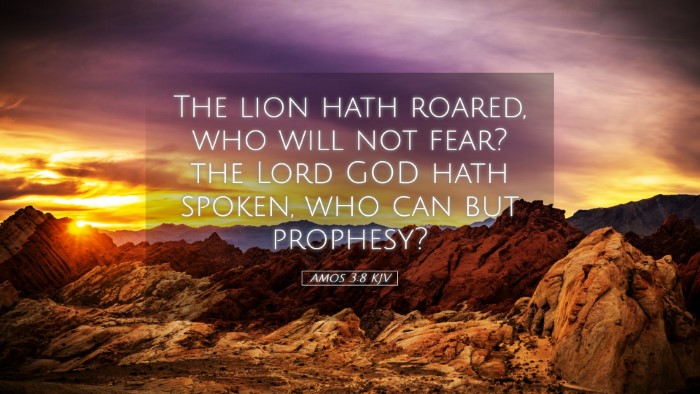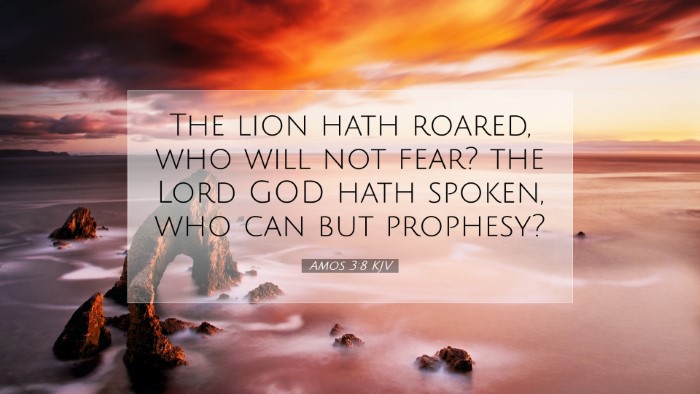Old Testament
Genesis Exodus Leviticus Numbers Deuteronomy Joshua Judges Ruth 1 Samuel 2 Samuel 1 Kings 2 Kings 1 Chronicles 2 Chronicles Ezra Nehemiah Esther Job Psalms Proverbs Ecclesiastes Song of Solomon Isaiah Jeremiah Lamentations Ezekiel Daniel Hosea Joel Amos Obadiah Jonah Micah Nahum Habakkuk Zephaniah Haggai Zechariah MalachiAmos 3:8
Amos 3:8 KJV
The lion hath roared, who will not fear? the Lord GOD hath spoken, who can but prophesy?
Amos 3:8 Bible Commentary
Commentary on Amos 3:8
Amos 3:8 states: "The lion has roared; who will not fear? The Lord GOD has spoken; who can but prophesy?" This verse serves as a pivotal proclamation in the message of Amos, emphasizing the authority and sovereignty of God who calls His people to heed His warnings and judgments.
Overview of the Verse
This verse encapsulates the urgency and serious nature of God's message through His prophet Amos. The roaring of the lion is a metaphor for the power of God’s voice, while the subsequent rhetorical questions serve to highlight mankind’s response to divine revelation.
The Lion's Roar: Divine Authority
The imagery of the lion speaks to the strength and authority of God's declaration. As noted by Matthew Henry, the lion’s roar signifies not just noise, but a compelling call to attention. The lion, a symbol of majesty and ferocity, signifies the seriousness of the Lord’s communication. Just as a lion’s roar stirs fear and respect among all who hear it, so does the word of God demand reverence and response.
The Fear of the Lord
The fear mentioned in this context is not merely a sense of dread, but rather a profound respect and acknowledgment of God’s power and holiness. Albert Barnes elaborates that acknowledging God’s authority invokes a reverential fear that is both appropriate and necessary for true worship. This theme of reverence permeates the Scriptures and calls believers to approach God with humility and respect.
The Prophetic Call
The second part of the verse presents a compelling rhetorical question: "who can but prophesy?" This declaration emphasizes that once God has spoken, the response of the faithful is to declare His message. Adam Clarke interprets this as highlighting the inevitability of prophetic utterance when one is genuinely aware of God’s presence and message. The prophet finds himself compelled to share the revelation, underscoring the urgency of prophecy amidst a disobedient people.
Human Response to Divine Revelation
The call to prophesy encapsulates the essence of the prophetic ministry—an inner compulsion to articulate the word of God. Matthew Henry points out that prophets, equipped with awareness of God’s voice, respond to the divine call with an obligation to relay the message. This underscores the distinction between true prophets, who are divinely appointed, and false prophets who claim authority without divine mandate.
The Implications for Israel
For the people of Israel, Amos’s message was particularly pointed. It highlighted their spiritual lethargy and moral corruption. The lion’s roar was intended to awaken them from their complacency. Albert Barnes suggests that the historical context of Israel's prosperity and moral decay made this prophetic word all the more necessary. They needed to recognize the seriousness of God's impending judgment as conveyed through Amos.
Call to Repentance
The roar symbolizes not only the announcement of judgment but also invites a response of repentance. Adam Clarke emphasizes that true prophecy leads to a pivotal point of decision for the listener. The fear induced by the roaring lion ultimately aims toward a transformative response, calling people back to fidelity and righteousness.
Application for Today’s Believers
In contemporary application, Amos 3:8 encourages present-day believers to be attuned to God’s voice above all others. Just as Amos was bound by divine mandate to share God’s messages, so too are modern Christians called to discern and declare His truth.
Listening to God’s Voice
Reflecting on this verse challenges believers to cultivate a deeper awareness of God’s presence in their lives. Matthew Henry urges that hearing the ‘lion’s roar’ requires attentiveness to God's Word and the prophetic voices within the church today. This attentiveness cultivates reverence, prompting a heart response that is critical in times of spiritual and moral crisis.
The Urgency of Prophecy Today
Believers today are equally compelled to speak the truth of God’s Word in a culture that often dismisses or distorts it. Albert Barnes articulates the importance of maintaining integrity in the prophetic voice, emphasizing that believers must speak the truth with love, urgency, and clarity. The call to prophesy remains vital as society grapples with moral ambiguity and spiritual apathy.
Conclusion
Amos 3:8 serves as a compelling reminder of God’s authoritative voice and the necessary response of His people. The symbolism of the lion not only conveys God’s power but also highlights the urgency of prophetic ministry. This text encourages believers to listen attentively to God’s messages, responding with reverence and the boldness to proclaim His truth in every generation.


